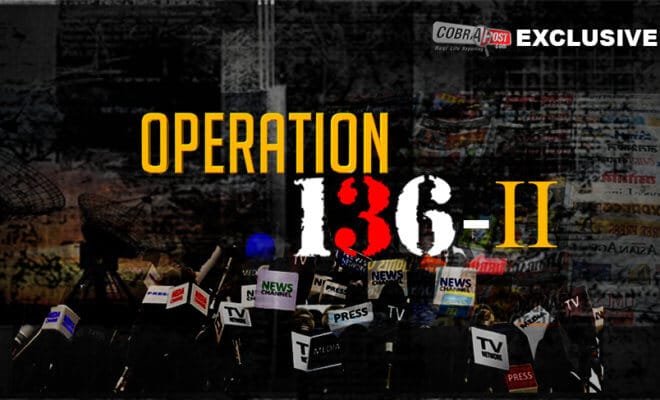India
Sting That Stings

Cobrapost released a series of videotapes based on an undercover sting operation, in which top executives of some of the most prominent Indian media houses discuss massive payments in exchange for promoting Hindu nationalist ideology. and political propaganda.
Photo: Cobrapost
Instead of seeking to censor, media executives captured in the Cobrapost sting should demand that it release its raw unedited tapes.
TV talk shows in India are scream fests. Rape! Horse-trading MLAs in Karnataka! Lion Modi! Fading Modi Magic! Petrol Prices on Fire! Leaked Exam!
Debate on any subject, however sensitive, nuanced or serious, for hosts and guests alike, is a blood sport. And everything and everyone is fair game.
Curiously, however, the high-pitched mainstream Indian media, both print and broadcast, have fallen deafeningly silent about one of the biggest scandals to strike at the heart of Indian democracy and freedom of the press in recent decades.
The fire this time is singeing much too close to home.
Cobrapost, a non-profit news website, released a series of videotapes based on an undercover sting operation, in which top executives of some of the most prominent Indian media houses discuss massive payments in exchange for promoting Hindu nationalist ideology and political propaganda. Cobrapost titled the series “Operation 136,” an allusion to India’s abysmal 136 global rank on the 2017 World Press Freedom Index (The rank has fallen to 138 in the recently released 2018 Index).
In the sting operation, reporter Purshp Sharma, poses as Acharya Atal, a Hindutva activist representing a wealthy sangathan, which is unnamed, but he insinuates is close to the Rashtriya Swayamsweak Sangh. He proposes a three-phase campaign in their media properties to promote Hindutva, a right-wing Hindu ideology that animates Prime Minister Narendra Modi’s governing Bharatiya Janta Party. Over a three-month long “soft” first phase, the media organizations would publish teachings from the Gita to propagate Hinduism as India’s defining ideology. In the second phase, as next year’s general elections approached, they are expected to promote prominent Hindutva leaders to polarize the electorate around communal lines. The campaign turns overtly political in the final phase, lampooning opposition figures as pappu, bua and babua, the BJP’s derisive nicknames for Congress President Rahul Gandhi, Bahaujan Samaj Party leader Mayawati and Samajwadi Party President Akhilesh Yadav respectively, and promoting positive coverage of Hindutva hardliners.
Some of the largest media organizations, including Bennett Coleman, publisher of Times of India, the world’s largest English daily, seemingly fell for the sting. So did executives of the India Today Group, another major magazine and TV conglomerate, the Hindustan Times, as well as 21 other national and regional media organizations. According to Cobrapost, only two — Bengali newspapers Bartaman and Dainik Sambad — of the 26 media organizations it solicited turned down its deal. The rest, it said, “almost all bent themselves backward to grab this opportunity,” and crumbled “under the weight of a ‘big business opportunity’ that was knocking on their doors without asking.”
In the videos released on its website Cobrapost.com, senior executives of several media organizations discuss the multi-crore campaign. The undercover acharya moves up the food chain, landing meetings with Kalli Purie, vice chairperson of the India Today Group, and Vineet Jain, Times Group managing director. Times executives propose a whopping Rs 500 crore ($75 million) budget, equivalent to almost 5 percent of the group’s annual revenues, while an India Today marketing executive pitches Rs 275 crores ($40 million), which is almost 20 percent of its 2017 revenues.
The videos also feature discussions of cash payments and ways to route money through intermediate third parties, raising flags about black money and the entanglement of big business, media and politics in the country.
Cobrapost claims that its recordings demonstrate how two dozen news organisations at the right price were open to “not only cause communal disharmony among the citizens, but also tilt the electoral outcome in favour of a particular party.”
Yet, save for a handful of online media platforms, most mainstream Indian media have buried the scandal. Several of the targeted media companies have accused Cobrapost of misrepresenting them by doctoring and manipulating the videos. Dainik Bhaskar, the second largest Indian newspaper, secured a court order to halt release of the videos relating to its executives. Some others, including India Today, Zee TV and Times of India, have served legal notices on Cobrapost to take down content related to them.
To be sure, Cobrapost muddied the sting with a convoluted media package that intertwined relatively innocuous religious programming and hardcore communal and partisan political advocacy. And it has released only edited excerpts of its undercover videos, which gives some credence to the protestations of the people captured in them that their comments may have been distorted. The website would have far greater credibility if it agreed to share raw video feeds from its stings.
Nevertheless, the videos raise disturbing questions about the endemic problem of paid content in the Indian media. The fact that so many Indian media organizations were willing to entertain in any form (advertising, advertorial or news) content that was proffered as blatantly communal and politically partisan is breath-taking.
It is hypocritical and unworthy for any credible media organization to seek shelter behind censorship and legal threats to prevent disclosure of what transpired between their executives and Acharya Atal. If they are as innocent as they profess, they should be demanding instead that Cobrapost release the full unedited videos so the public can judge their probity.
Sunshine, after all, as the media are often fond of lecturing, is the best disinfectant.
So, where is the outrage, Times Now, TV Today, Zee TV?
COBRAPOST, DISINFECT NOW! RELEASE THE RAW TAPES!
